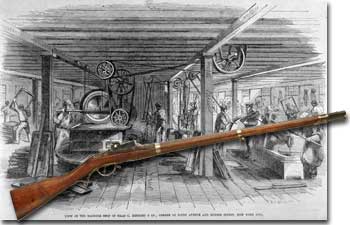
| Interchangeability - the ability to mass-produce items using standardized parts - is the foundation of modern industry. In 1823 John H. Hall, inventor of the breech-loading rifle, first achieved interchangeability in the mass production of rifles. Working at Harper's Ferry Arsenal under government contract, he also developed the water-powered machinery that cut, shaped, and smoothed the metal parts used to assemble the rifles. Hall's methods became known as the "American system of manufacture," and by the late 1850s, products like revolvers, reapers, and sewing machines were assembled with machine-made interchangeable parts. | ||||
|
View
in the Machine Shop of Silas C. Herring & Co., engraving from Frank
Leslie's Illustrated Newspaper, August 15, 1857
.52 caliber breech-loading percussion rifle, U.S. model 1819, J. H. Hall, Harper's Ferry Arsenal, Virginia, 1832 Click image to enlarge. Copyright 2002 The Chicago Historical Society |
||||
|
|
||||

